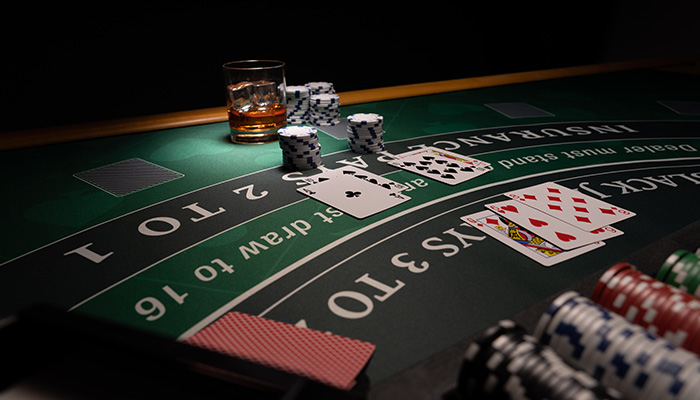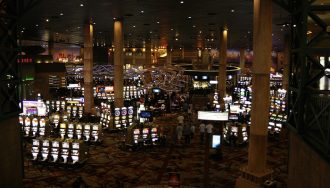Underground Casinos Are Still Going Strong In America
 Underground Casinos In America
Underground Casinos In America
From Los Angeles to Boston, underground casinos dot the American landscape. Despite there being more than 1000 licensed, legal commercial and tribal casinos in the US, there are many thousands more of these small illegal operations, often run by organized crime. Increasingly in the southwest, Mexican cartel use the enormous amounts of cash siphoned off of these black market betting operations to fund their other operations. While in the Northeast, legacy organized crime families continue decades-old gambling operations under the radar.
Summary
Let’s take a look at some of the games that these types of operations offer, and what differentiates underground casinos from quasi-legal offshore gambling sites. From the cartel-operated “casitas” in San Diego and Los Angeles to the ever-increasing grey market “skill games” that fill the backrooms of gas stations and restaurants in states like Georgia and Florida, illegal gaming operations persist throughout the country. What impact do they have on the tax base of states that have passed some legal gambling options?
- 🎰What Are Underground Casinos?
- 🎰What Goes On In Underground Gambling Hotspots?
- 🎰What Is Illegal Gambling?
- 🎰Is Underground Poker Illegal?
- 🎰Conclusion
What Are Underground Casinos?
Legal real money casinos are available in almost 40 states. Online casinos are legal now in seven. But underground casinos flourish in every corner of America. Sometimes illegal gambling is just a question of ease of use. Not everyone in America’s large cities has the time or resources to travel hours to some distant resort to place a bet. But many may know an underground casino in the back of a restaurant somewhere that the cops leave alone where they can go and play slots.
Or perhaps your father or grandfather used to shoot craps in the back of that restaurant over by the tracks every Thursday night after the baseball game, so you drop in once in awhile to see his old buddies and shoot a few hands.
Or maybe you have got to work late Friday, but you’re dying to play some Poker. But there’s no way you can make it down to Atlantic City because you have that thing with the family on Sunday. The guys know a place uptown where they spread a couple of games on the weekend, and they’re telling you, you’ve got to try it. And you’re wondering if underground poker is illegal, even?
That’s how billions of dollars flow through underground casinos every year: habit, ease of making a bet, and the general acceptance of many communities that this is how it’s always been. Gambling, both legal and illegal has become pervasive in America, and not everyone knows or cares about the legal lines that separate the two.
What Goes on in Underground Gambling Hotspots?
The nature of underground gambling depends a lot on what part of the country you are in or even what neighborhoods it is offered in. In a big city like New York, you can find mob-run casinos in the Bronx or Queens, which offer underground poker games, craps games, some blackjack, and possibly even some Vegas-style slot machines, while in China town you are much more likely to find games like Sic Bo, Pai Gow tiles, or Baccarat.
In Southern California and Florida, most casitas or underground gambling spots are filled with electronic slot-like games that bear little resemblance to classic slot games. This isn’t to say that you can’t find an underground poker game in Los Angeles, just that these operations are generally far removed from the Cartel-run slot casitas.
You can find illegal gambling in run-down slums, or you can find it running in a rented mansion in the best part of town, just depending on the target market.
And the scale of America’s illegal gambling problem is just massive. An American Gaming Institute report in 2022 estimated that Americans bet more than 500 Billion dollars gambling with unlicensed or unregulated gaming operators per year. They also estimate that there are more than 600k illegal gambling machines spread across the country, and the impact of all this was more than 13 billion in lost tax revenue for cash-strapped states.
Billions of that money are in underground poker rooms, both large and small. Many people ask “ls it legal to play poker at home”? And the answer, in many states, at least, is yes, as long as the house doesn’t take a rake from the game. However, even a friendly house game can bring a raid in some states like Utah or Hawaii.
Large-scale illegal poker operations on the East Coast often have ties to organized crime, either Eastern European or homegrown. While the West Coast seems to be more independent operators with an entrepreneurial flair, wherever you play, you should know that a criminal element is not very far away, as these games need protection.
What Is Illegal Gambling?
Illegal gambling is any form of wagering not made legal in your state. According to the American Gaming Association this includes Internet gaming with unlicensed offshore casino sites, back room poker and dice games, and playing the so-called “skill games” frequently found at gas stations or diners, as well as those hundreds of thousands of unlicensed slot games.
While offshore casino sites may be illegal and risky, there is a very small chance that the police will issue you a citation. Betting with these offshore casinos may see your money disappear into a maze of Cayman Island accounts instead of being paid out when you win. Clearly, not every form of illegal gambling is as illegal as others.
The skill games are a perfect example. Marketed as legal as they are not gambling devices since they have some skill tests such as memory or speed, but otherwise play just as a slot machine would, these games live in a grey area still being decided by state courts. In some states like Virginia and Pennsylvania, they are on the cusp of becoming legal. These machines are increasingly seized and destroyed in many others, like Florida and Georgia.
Underground casinos, in particular, are generally not grey areas. These are actual gambling operations with no legal pretense, meant to separate the gambler from their money as quickly as possible. Many underground gaming machines have house edges as high as 25 percent.
Is Underground Poker Illegal?
Billions of that money are in underground poker rooms, both large and small. Many people ask is it legal to play poker at home? And the answer, in many states, at least, is yes, as long as the house doesn’t take a rake from the game. However, even a friendly house game can bring a raid in some states like Utah or Hawaii.
But running a long-standing game without a rake is a lot of work for no return. So, even friendly neighborhood games can evolve into underground gambling as the operators rationalize charging a little bit to host the game. Increasingly, legalization of online gaming, including poker, is seen as a way to circumvent these background games. Legal online poker both allows states to add tax revenue, while giving those who wish to play a safe legal option in order to continue enjoying their pastime.
Large-scale illegal poker operations on the East Coast often have ties to organized crime, either Eastern European or homegrown. While the West Coast seems to be more independent operators with entrepreneurial flair, wherever you play, you should know that a criminal element is not far away. These games need protection, or they will be robbed or raided, so they often have no choice but to begin paying someone for that protection.
Conclusion
While legal gaming has swept America, underground casinos continue to thrive not only in the dark corners but increasingly in affluent suburbs. The lure of easy money fueled by America’s increasing appetite for placing a quick bet, along with much laxer sentences for people convicted of gaming offenses when compared with drugs, means that many organized crime families increasingly turn to illegal gambling to put money in their coffers.
While many Americans seem to believe that the days of illegal gaming are long gone, increasing arrests and raids, along with the discovery of much more sophisticated operations, seem to indicate that illegal gambling is not yet done with America.
One answer may be the expansion of legal online casino sites in states with gaming laws on the books as this may one day replace the huge amount of money that flows through both onshore illegal casinos and offshore grey market ones. This would also allow a more equitable distribution of gaming, in which those without the means to travel hours to a casino upstate could gamble with their phones or other mobile devices. Another may be finally making grey market “skill” slots either legal or illegal and enforcing the laws either way.




